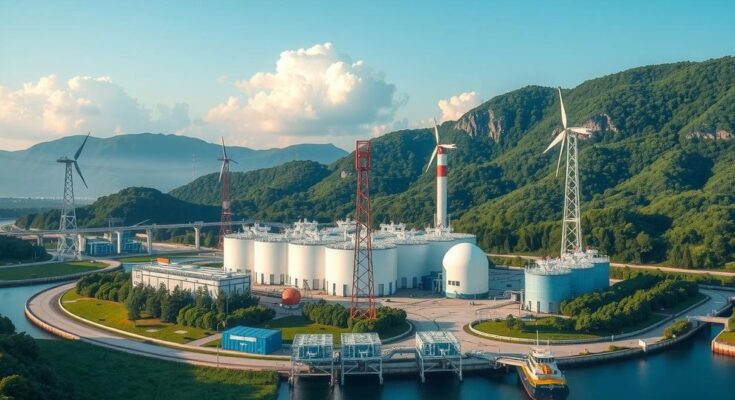Pierre Poilievre advocates for increased Canadian LNG exports despite environmental risks and market concerns. His assertions about overseas demand face scrutiny from experts highlighting decreasing global LNG interest in favor of renewables. The Trudeau government has provided some support for LNG projects, but significant challenges remain in financing and infrastructure development, complicating the vision for growth in this sector.
Pierre Poilievre, leader of the Conservative Party and potential Canadian prime minister, advocates for an aggressive expansion of liquefied natural gas (LNG) exports, despite significant environmental concerns and a likely market oversaturation in the near future. In a discussion with climate-change skeptic Jordan Peterson, he questioned Canada’s reliance on oil imports, emphasizing Canada’s vast natural gas reserves and potential export opportunities. Poilievre claims political interference stifles LNG development, arguing that desperate energy needs in countries like Germany and Japan position Canada favorably to meet such demands.
However, significant economic and logistical challenges persist in expanding Canada’s LNG sector. Reports indicate declining Japanese LNG imports and an anticipated drop in demand given their increased focus on nuclear and renewable energy sources. Although the Trudeau government has sanctioned some LNG ventures, they remain firm against subsidizing fossil fuel projects, citing inefficiency and a commitment to clean energy targets by 2030.
Expert analyses reveal that, contrary to Poilievre and Peterson’s assertions, current European and Asian markets are diminishing their reliance on LNG. Changes in energy law and the rise of inexpensive renewable sources in Europe add pressure against further fossil fuel investments, with rising emphasis on cost-cutting and climate commitments, making Canadian LNG a less competitive option.
Furthermore, the suggestion that Canada could adequately supply Germany with LNG has been met with skepticism by German leaders, who have shown little enthusiasm for such arrangements. Prime Minister Trudeau has indicated a preference for exporting hydrogen rather than natural gas and recognized that substantial infrastructure investments would be required to facilitate LNG shipments to Europe.
Concerns regarding Canada’s potential to support India in reducing coal consumption through LNG exports have also been raised. Recent reports examine assumptions made about LNG’s environmental benefits and point to the complexities involved, such as the environmental costs of extraction and transport process. The critique emphasizes that supporting fossil fuel exports delays necessary transitions to renewable energy strategies.
The discussion surrounding Canadian LNG expansion highlights a divide in political and economic perspectives. Pierre Poilievre contends that barriers to LNG exportation stem from government inefficiencies, while experts identify tangible obstacles both in market demand and environmental impacts. Decarbonization efforts and shifts in global energy policy towards renewables challenge the feasibility of increasing fossil fuel exports, particularly as international investments trend away from fossil energy. Additionally, statements endorse a green energy transition, intensifying the debate on the role of LNG in achieving climate goals.
Despite Pierre Poilievre’s push for LNG expansion in Canada, significant logistical, economic, and environmental barriers suggest that such ambitions may be overly optimistic. Various expert analyses indicate declining global demand for LNG in favor of renewable energy, challenging the notion that Canada can become a leading supplier. Furthermore, commitments to climate goals necessitate a reconsideration of fossil fuel dependence and the urgency to prioritize sustainable energy investments.
Original Source: www.desmog.com




